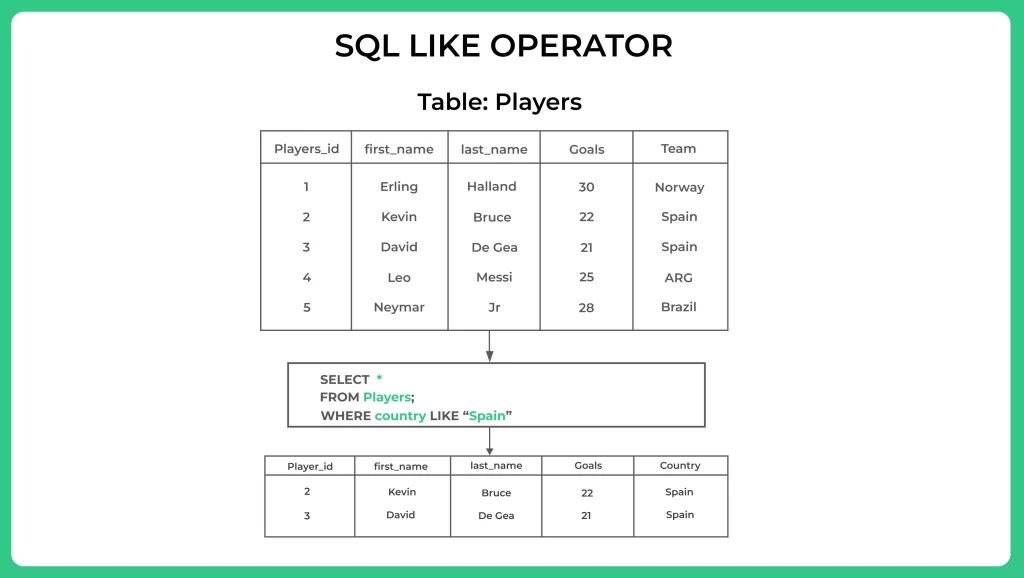SQL LIKE Operator with Examples

Introduction to LIKE Operator
The SQL LIKE Operator is a powerful tool used in database queries to perform pattern matching on text data. It allows users to search for specific patterns within strings, making it an essential component in SQL queries for tasks like data filtering and searching.
In this article, we will explore the various aspects of the SQL LIKE Operator, its syntax, usage of wildcard characters, performance considerations, best practices, and real-world use cases.
SQL LIKE Operator
The SQL LIKE Operator is used to match patterns within text columns. It employs two wildcard characters:
- % (percentage sign): Matches any sequence of characters, including none.
- _ (underscore): Matches any single character.
The LIKE Operator is commonly used with the WHERE clause in SQL queries to filter data based on specific patterns.
Syntax of the SQL LIKE Operator
- The basic syntax of the SQL LIKE Operator is as follows:
- The column_name represents the name of the column to search, table_name is the name of the table, and ‘pattern‘ is the specific pattern we want to find within the column.
SELECT column_name FROM table_name WHERE column_name LIKE 'pattern';
Using Wildcards
Wildcards are special characters that allow for flexible pattern matching. The two commonly used wildcards are:
- % (percentage sign): It matches any sequence of characters (including none).
- _ (underscore): It matches any single character.
Example 1: Using the SQL LIKE Operator
SELECT employee_name FROM employees WHERE employee_name LIKE 'J%';
Example 2: Wildcard Characters Explained
SELECT employee_name FROM employees WHERE employee_name LIKE '%son';
SELECT employee_name FROM employees WHERE employee_name LIKE '___e';
SELECT product_name FROM products WHERE product_name LIKE 'S%o_r';

Filtering Players from Spain
- Suppose we want to retrieve a list of players who belong to Spain. We can achieve this using the SQL LIKE Operator to match the country name.
SELECT * FROM Players WHERE Country LIKE 'Spain';
Output of the Query: Player_id | first_name | last_name | Goals | Country ---------------------------------------------------- 2 | Kevin | Bruce | 22 | Spain 3 | David | De Gea | 21 | Spain
Click below to access free SQL quizzes which will be helpful in your placement exams
Case Sensitivity with the SQL LIKE Operator
The SQL LIKE Operator’s default behavior is usually case-insensitive, meaning it treats uppercase and lowercase characters the same. However, this behavior can vary depending on the database’s collation settings.
Case-Sensitive Searches
- If you need a case-sensitive search, you can adjust the collation or use the BINARY operator.
Case-Insensitive Searches
- For case-insensitive searches, ensure the collation is set accordingly, or convert the search term and the column data to the same case.
Real-World Use Cases Of SQL LIKE Operator:
Best Practices for Using the SQL LIKE Operator
Avoiding Leading Wildcards
- Whenever possible, avoid using leading wildcards at the start of the pattern, as it hinders indexing and can lead to slower queries.
Limiting the Use of Wildcards
- Try to keep the use of wildcards to a minimum. Using them at the end of a pattern tends to be more efficient.
Conclusion
The SQL LIKE Operator is a valuable asset when it comes to searching for specific patterns within text data in SQL databases. Understanding its syntax and using wildcard characters appropriately can enhance its functionality.
Prime Course Trailer
Related Banners
Get PrepInsta Prime & get Access to all 200+ courses offered by PrepInsta in One Subscription

Question 1.
What is the difference between using LIKE and equals (=) in SQL?
The LIKE Operator allows for pattern matching, whereas the equals (=) operator performs exact matches.

Question 2.
Can I use multiple wildcards in a single LIKE statement?
Yes, you can combine multiple wildcards in a single LIKE statement to perform complex pattern matching.

Question 3.
Does the LIKE operator support regular expressions?
No, the LIKE Operator does not support regular expressions; it only works with the % and _ wildcards.

Question 4.
How can I improve the performance of LIKE queries?
To improve performance, avoid using leading wildcards and limit the use of wildcards at the start of the pattern.
Get over 200+ course One Subscription
Courses like AI/ML, Cloud Computing, Ethical Hacking, C, C++, Java, Python, DSA (All Languages), Competitive Coding (All Languages), TCS, Infosys, Wipro, Amazon, DBMS, SQL and others




